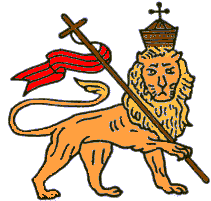A B i t t e r E n d i n g
A f t e r m a t h
A f t e r m a t h
A f t e r m a t h
The Conclusion
photo caption
Emperor Selassie and General Cunningham in Addis Ababa, flanked by the bodyguards of the emperor's during the victory parade. General Cunningham was given command of the British army in North Africa, but did not last long against German General Rommel & was relieved.
Photo courtesy of the Imperial War Museum, London
photo caption
Patriots on the day of Emperor Selassie's return to Abbis Ababa prostrating themselves before him as a sign of loyalty to him and to their warrior code.
Photo courtesy of the Imperial War Museum, London
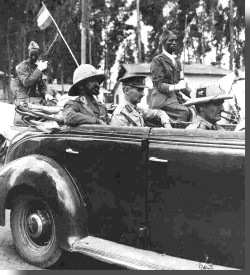

The aftermath of victory brought Wingate's mission and presence to a hurried end. After attending the funeral of one of his men, Wingate was ordered on June 1 to fly to General Cunningham's headquarters. There he was informed that Gideon Force no longer officially existed and that he was no longer a commander. Emperor Selassie had recently appointed his new government ministers without British political input. Cunningham believed that Wingate was going to meddle in the politics of Ethiopia, and he did not want him interfering with events in British-occupied Ethiopia like he had done in Palestine. Said one staff officer at Cunningham's headquarters, "Everybody at Force HQ distrusted him. He had brought the Emperor in. They wanted him out as soon as possible... they were afraid he would meddle in politics."1 Without praise for his success and without giving him a chance to give his regards to Emperor Selassie, Wingate was ordered to Khartoum on a flight back. The next day he departed Addis Ababa.
The last of the main Italian forces were defeated in May at Amba Alagi, before the coming of the seasonal summer rains. British army and air force units were now freed up for needed re-deployment to the important front in North Africa. And the Red Sea was made safe for important neutral American shipping. Fighting went on though, to mop up the Italian remnants in the rugged northern interior region through the rest of the year. In November, after some hard fighting a mixed force of East African & Patriot force were able to subdue the final holdouts. In spite of their overall efforts, the Patriots and Gideon Force were left out of the official after-action praise. While ignored by the conventional army, the work of Gideon Force and the Operational Centers was not forgotten by all. SOE believed the experience invaluable and useful for later missions in Occupied Europe.
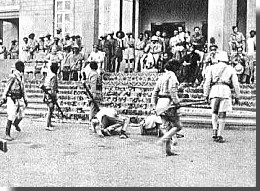 Ethiopia was liberated and Emperor Selassie back in power. He worked to ensure Ethiopia would not exchange one colonial master for another. London agreed not to undertake any new empire building, and in January of 1942 a relieved emperor signed an agreement with London acknowledging Ethiopian sovereignty. Turning to the United States for political and economic support, he was able to ensure this.
Ethiopia was liberated and Emperor Selassie back in power. He worked to ensure Ethiopia would not exchange one colonial master for another. London agreed not to undertake any new empire building, and in January of 1942 a relieved emperor signed an agreement with London acknowledging Ethiopian sovereignty. Turning to the United States for political and economic support, he was able to ensure this.
Thoughts Amid Despair
Back in Cairo and without an official job, Wingate was told his rank had now reverted back to Major. Suffering from an outbreak of malaria, he was ignored and treated with disdain by a staff uninterested in him. It was June of 1941 and the war was in a critical stage in the Mediterranean. British forces in Libya had been driven out, the Cyrenaica port of Tobruk was under siege, and an offensive strike against the German forces in the Libyan desert was being soundly defeated. Crete had just been conquered with heavy losses to Allied forces following the disastrous British intervention in Greece. Allied forces were attacking into Vichy-controlled French Syria to forestall an Axis intervention, and meeting tough resistance. Other Allied units were engaged in putting down a pro-Axis revolt in Iraq. With these pressing concerns and strategic threats across the map, no one wanted to think of the side-show of East Africa, especially about what was considered the minor activity of Gideon Force. The Cairo staff gave Wingate a hard time on his recommendations for awards for his personal and obstructed his attempts to get hardship-pay for them as well. Angry at the indifference given to Gideon Force's achievements and Ethiopian political concerns, Wingate started believing the authorities were deliberately playing down his achievements. So he set out to write a report for General Wavell on Gideon Force.
photo caption
The Italian surrender in the Walchefit region in September. The Italian forces here were permitted to surrender past an honor guard. The Patriots & Gideon Force units played a role in the fighting till the end of the campaign.
Photo courtesy of the Imperial War Museum, London
In his paper ‘Appreciation of the Ethiopian Campaign,’ he outlined the success his force had achieved in Ethiopia, and what he saw as proper unconventional warfare strategy. In the writing he argued that a properly supported and led military unit operating against enemy lines of communication could be very effective in conjunction with the use of regular forces. Wingate proposed that, "Given a population favorable to penetration, a thousand resolute and well-armed men can paralyze, for an indefinite period, the operation of a hundred thousand."3 He asked for such a force to be formed and argued its effectiveness could be increased by the use of regular air support. He stated that, "To sum up it is proposed to assemble and employ a force of the highest fighting qualities capable of employment in widely separated columns; that it should employ the friendly portion of the population for cover and support… that it should be allocated an objective behind the enemy's lines, the gaining of which will decisively affect the campaign; and that to enable it to carry out its task it must be given a political doctrine consonant with our war aims."4 Thinking of the use of political propaganda to win over local populations, and as he saw it of British efforts to stifle Ethiopian freedom, he wrote that attempts to raise future rebellions amongst populations must be honest ones and should appeal to justice. He added for such propaganda to be effective, using Ethiopia as an example, "We owed this success to the fact the Ethiopians believed our propaganda... Righteousness exhalteth a nation."5
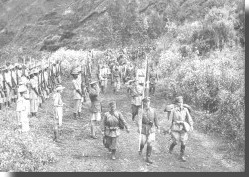 In another part he expressed the bitter feelings he had built up inside. He complained about the lack of proper support Gideon Force had to endure which reduced their effectiveness, such as the lack of air support. He criticized the lack of quality of the equipment, especially those of communications and weaponry. And he criticized the British personal assigned to him and their selection method as being mediocre, stating he had received, "the scum of the army."6 And on the break-up of that unit Wingate concluded, "To dissipate such a military organism after it has been created and while the need for it still exists or to suppose that you get equal results from the employment of equal numbers in sporadic operations, is the mark of the military ape."7 While
greatly irritated
with such language and criticisms, General Wavell was impressed with the main ideas on strategy & some of the criticisms. But Wavell was in the process of being relieved of command of the Middle-East, and his promise to look into Wingate's grievances and correct them was ignored by the staff.
In another part he expressed the bitter feelings he had built up inside. He complained about the lack of proper support Gideon Force had to endure which reduced their effectiveness, such as the lack of air support. He criticized the lack of quality of the equipment, especially those of communications and weaponry. And he criticized the British personal assigned to him and their selection method as being mediocre, stating he had received, "the scum of the army."6 And on the break-up of that unit Wingate concluded, "To dissipate such a military organism after it has been created and while the need for it still exists or to suppose that you get equal results from the employment of equal numbers in sporadic operations, is the mark of the military ape."7 While
greatly irritated
with such language and criticisms, General Wavell was impressed with the main ideas on strategy & some of the criticisms. But Wavell was in the process of being relieved of command of the Middle-East, and his promise to look into Wingate's grievances and correct them was ignored by the staff.
While feeling depressed and a failure, in the middle of suffering a malaria attack, Orde Wingate attempted to commit suicide. His body racked with parasites from cerebral malaria, Wingate went to see a civilian doctor to get the anti-malarial drug Atabrine (Mepacrine). He was afraid if he saw a military one this would give others an excuse to relegate him to a future minor role. The drug can produce as a side-effect depression if taken in high dosages. This is what Wingate began to do to get the fever down. On July 4th he was running a very high fever of 104 degrees and was without any Atabrine. In a demented state from the malaria, combined with his already depressed state of mind, he felt such despondency as to become suicidal. He shut himself inside his Cairo hotel room. Stabbing himself several times in the neck he just missed his artery and jugular, and collapsed to the floor. From a room next door, an inquisitive officer heard the thud from the fall right after hearing the door lock. Becoming alarmed, he rushed in to find Wingate and apply first-aid. Surgery and a large transfusion of blood saved his life.
photo caption
Wingate with Selassie. Wrote Captain Allen on Wingate, "His big nose & shaggy beard could recall, as he proclaimed the glories of Israel, the ghost of some harassed hill prophet; but the bony structure of the face, the thin, high-bridged line of the nose and the gleam of the deep blue eyes declared some old Norse blood soured through Covenanting centuries."11
Photo courtesy of the Imperial War Museum, London
New Start
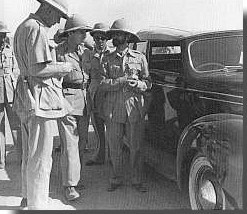 In Cairo a doctor diagnosed Wingate as suffering from depression brought on by Atabrine poisoning, with a non-battle wound. This cleared him for recuperation and future duty. September, 1941 saw Orde Wingate boarding a troopship to Britain. The long sea journey allowed for further convalescence, the doctor on board confirming that Wingate was recovering his strength and that he be considered medically fit after a short time. Back in England in November, he saw Dr. Weizmann and the two discussed their mutual desire for a Jewish national army. Helped by the intervention of Weizmann and a Jewish doctor he had first met back in 1938, Wingate was able to consult a prominent medical physician. Thanks in part to the doctor's recommendation that he could find nothing that would prevent his patient from returning to service, on December 30 Wingate was declared medically fit for duty.
In Cairo a doctor diagnosed Wingate as suffering from depression brought on by Atabrine poisoning, with a non-battle wound. This cleared him for recuperation and future duty. September, 1941 saw Orde Wingate boarding a troopship to Britain. The long sea journey allowed for further convalescence, the doctor on board confirming that Wingate was recovering his strength and that he be considered medically fit after a short time. Back in England in November, he saw Dr. Weizmann and the two discussed their mutual desire for a Jewish national army. Helped by the intervention of Weizmann and a Jewish doctor he had first met back in 1938, Wingate was able to consult a prominent medical physician. Thanks in part to the doctor's recommendation that he could find nothing that would prevent his patient from returning to service, on December 30 Wingate was declared medically fit for duty.
Wingate met with his old acquaintance Secretary of State for India Leopold Amery, and gave him a copy of his Ethiopian report. Impressed, Amery passed along (after he encouraged Wingate to edit out the most offensive passages) copies to the military Chiefs of Staff and to Prime Minister Winston Churchill. He also notified Archibald Wavell, who as Commander-In-Chief India was responsible for the Indian war theatre, that Wingate was fit and ready to resume military duties. In February of 1942 Wavell requested British Army headquarters send Wingate to him as soon as possible for unspecified staff duties. Wingate left London on February 27th for another war, in Burma.
1. David Shirreff, Bare Feet And Bandoliers
(London: Radcliffe Press, 1995), 213-14.
2. Douglas Dodds-Parker, Setting Europe Ablaze (London: Springwood, 1983), 73.
3. Christopher Sykes, Orde Wingate (New York: World Publishing Company, 1959), 324.
4. Trevor Royle, Orde Wingate (London: Weidenfeld & Nicolson, 1995), 213.
5. Sykes, 325.
6. Royle, 213.
7. Ibid, 213.
8. Sykes, 327.
9. Ibid, 332.
10. Ibid, 333.
11. W. E. D. Allen, Guerilla War in Abyssinia
(London: Penguin Books, 1943), 93.
